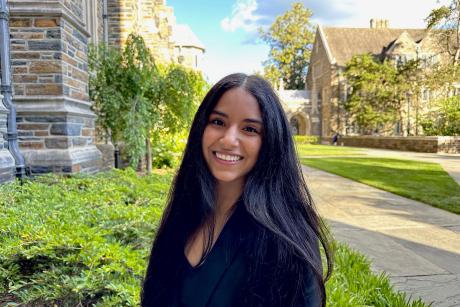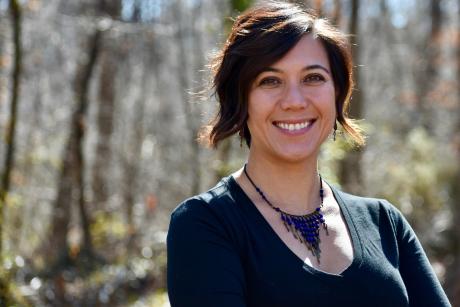
Photo credit: Chip Vincent (Unsplash)
Published March 12, 2024, last updated on March 18, 2024 under Research News
Why Marcia Owen cares for Durham isn’t hard to understand. She’s a native, graduating from Duke University in 1978. But she sometimes doesn’t recognize the city she has known all her life, particularly as a wave of gun violence spreads across some Durham neighborhoods. Now, attending vigils for those killed by gunfire has become her norm.
“There was so much violence, and it took me to my knees,” says Owen, a community activist who is among the leaders of a group called Restorative Justice Durham . “These things shouldn’t happen, not in my town.”
More than 48,000 people died from gun-related injuries in the U.S. in 2023, the Pew Research Center reported. In Durham, gun violence has long been an issue, but shootings jumped 66 percent in 2020, according to a joint report from Duke’s Sanford School of Public Policy and the Wilson Center for Science and Justice, raising alarm about an urgent public health crisis. A disproportionate share of those victims are young, Black men.
In 2022, Owen helped launch a new program to give gun violence victims that voice. Called Prescriptions for Repair (P4R), it organized listening sessions with Durham residents affected by gun violence, both to help them cope with their trauma and to hear their ideas for addressing the problem in their communities.
The pilot program, which grew out of work by Restorative Justice Durham and collaboration with Duke, North Carolina Central University and the City of Durham, ran through October 2023 and recently published its final report. Its organizers hope it provides a model for more permanent efforts in the city to provide support and resources for gun survivors.
“We needed to hear from gun violence survivors so we can know what needs to be done to make things right,” says Owen, who co-led the program.
Healing Wounds
Henry Rice, M.D., a Duke pediatric surgeon and professor with the Duke Global Health Institute who co-led Prescriptions for Repair, says the program reflected the need to think not just about healing physical wounds from violence, but the deeper trauma to individuals and communities.
“In the clinical world, we are good at treating kids and sending them back into a world that isn’t kind to them,” Rice says. “We fall short on the harm created after-the-fact.”
For more than a year, facilitators held listening sessions in libraries, churches and other private spaces across Durham to hear the experiences of gun violence victims. At one session, a teen confessed he harbored guilt over his uncle’s shooting death, even though he wasn’t involved. Another person who survived a shooting said they were initially too afraid to step outside the house. After attending multiple listening sessions, they found the courage to leave more often.
For Owen, the stories evoked memories of losing a friend to gun violence. “I experienced a kind of shattering inside myself that took my sense of safety, logic, and trust,” she says. “I felt judged, isolated, and frustrated that the singular public response was a criminal legal system. For me and most survivors, there was no arrest, no accountability and absolutely no care for our suffering.”

Henry Rice, M.D., a DGHI professor and a...
Similar feelings of helplessness led Rice to become involved with the program. He’s lost track of how many gunshot victims he has operated on, but he recalls one incident in 2021, in which four people were injured and two were killed in a Durham shooting. Rice oversaw surgeries on three of the victims , all of whom were younger than 18.
Rice met Owen years ago through his wife, Jackie. They’ve worked together on programs offered by Restorative Justice Durham. Around the time that Rice operated on those three gunshot victims, Owen was looking for community partners to help implement Prescriptions for Repair across Durham.
Most gun violence policies are based on expert opinions and studies, but few take into account the views of people experiencing the violence, Rice says. He and Owen hope the success of Prescriptions for Repair will convince the city to fund a permanent office to provide resources for gun violence survivors and their communities.
“Programs such as Prescriptions for Repair have a tremendous ripple effect – take one program and it sets up the opportunity for more,” Rice says. “We can take a program like this and help build a better world around us.”
Survivors as the Experts
“What needs to be done to make things as right as possible?”
At every listening session, facilitators asked this question, inviting ideas to help curb gun violence across the city and mend communities. Survivors often cited the need to eliminate economic inequalities and unfair housing practices and encouraged the city to support programs that keep children in school and provide job training.
Azmen Johnson, the program’s coordinator and an elementary school educator, says the survivors’ recommendations show that gun violence is the result of interconnected, deeper issues.
Raised in East Durham, Johnson says she became immune to the sounds of gunfire. She and her sister were shot at while driving to a New Year’s Eve celebration at a church before she was 20 years old.
“Durham has been synonymous with crime, and it has been like that since I was a child,” she says. “This has been plaguing our city daily in the midst of everyone trying to live and thrive here.”
But the biggest lesson from Prescriptions for Repair may be that it takes more than surgery or medication to recover from gun violence. And when survivors are given the chance to speak and be heard, it can help heal the wounds of an entire community.
“There’s an imbalance, and it has to be dealt with,” Johnson says. “When you get rid of [those issues], you won’t need the gun. This wisdom [from survivors] won’t just be talked, thought or prayed about. We can use this to create something that doesn’t exist in Durham for our survivors.”


